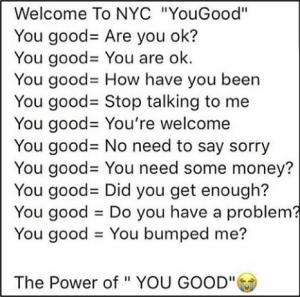
Growing up in New York, I heard the phrase ‘you good’ quite a lot. Thinking back on it, there were so many ways to interpret this casual question or statement. The most obvious meaning of ‘you good’ has for me always been ‘are you ok?’ when asked as a simple question. Beyond that, I came to realize that the ‘you good’ colloquialism could also mean ‘yes, you are in fact ok,’ ‘thanks, that’s enough for me,’ ‘no need to apologize,’ ‘wow, you’re really smart,’ ‘I wonder if everything is okay with you financially,’ and many other things depending on the inflection, the tone, and the situation in which it was asked or stated.
Similarly, in response to ‘you good,’ a person could say ‘it’s good, ‘I’m good,’ ‘all good’ and really mean a variety of different things. It could be a quick way to say ‘yeah, everything is ok’, it could be a polite brushoff to avoid deeper conversation, or it could be a complete masking of true emotions. When we boil our conversations down to these kinds of exchanges, it becomes really clear how miscommunication, misinterpretation and misdiagnosis can easily occur.

Dig Deeper
In this time when emotions are running high, fuses are running short, and people are running ragged, it’s important to dig deeper. The power of meaningful conversation happens when you don’t take ‘I’m good’ as a final answer. Try moving on to some follow up questions (without being too annoying of course) if you suspect that a friend or a loved one could use some extra support. The same would also hold true if as a parent you hear your kid say ‘I’m fine,’ ‘everything’s fine,’ or ‘nothing’s wrong’ when their mood, demeanor or actions tell you otherwise.
Words like ‘good’ and ‘fine’ and ‘okay’ are so overused in our society. Yet I would venture to say that many of us are not ‘good,’ ‘fine’ or ‘okay’ right now. If you find yourself feeling less than good or fine, put that ego aside and talk it out with someone – a relative, a friend, or a professional. The important thing is to connect and get help if and when you need it.

A Time for Compassion
Lately I’ve come across various social media posts declaring that COVID’s impact on collective mental health has been way overblown. Perhaps those social media post authors should be congratulated for being impervious to and unscathed by the brunt of COVID’s impact. To me, it is truly difficult to fathom how the unquestionable loss of life, loss of income and loss of social connectivity as a direct result of COVID would not cause an increase in stress, anxiety or mental hardship on a widspread scale. Adapting and adjusting to major change is not as easy for some as for others. At this time when so many are in crisis, empathy, kindness and compassion are more important than ever.

In-Habiting Self Care
In a Thrive Global article, Arianna Huffington wrote about microsteps, or very small changes, that we can take to course-correct stress and mental well-being. These are healthy new habits that can literally change your life. Given that up to 45% of our daily behavior is made up of small, habitual activities, it stands to reason that even deciding to change a few of them can have a ripple effect on leading to positive change. Some of her favorites:
For better sleep
For better nutrition
For more movement
For more focus
For a healthier relationship with technology
To be more creative
To prioritize your time more productively
To help integrate work and life
Sharing is caring! Tell us about your favorite positive microstep habits that have helped transform your mind and emotions for the better. Thanks for reading.

Disclaimer: Statements on this website have not been evaluated by the FDA. These products are not intended to diagnose, mitigate, treat, cure, or prevent any disease, nor are the products intended to affect the structure or any function of the body of man/woman or other animals. CANNABIDIOL USE WHILE PREGNANT OR BREASTFEEDING MAY BE HARMFUL. KEEP OUT OF REACH OF CHILDREN. Humanist Beauty Herban Wisdom products include hemp extract that contain less than 0.3% THC. Products containing CBD or THC are not to be used by or sold to persons under the age of 21.
We don’t retouch the skin of the model humans shown on this website. Keepin’ it real.